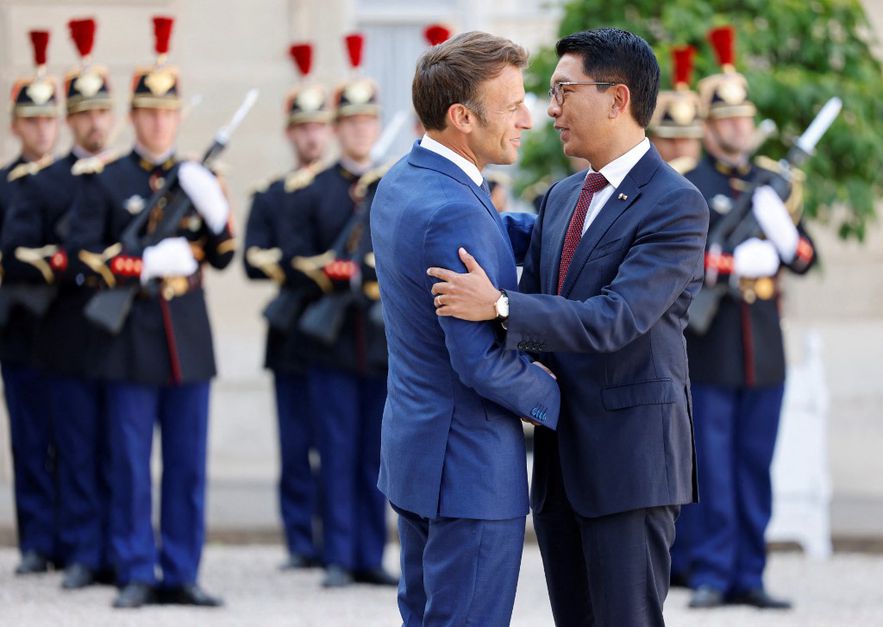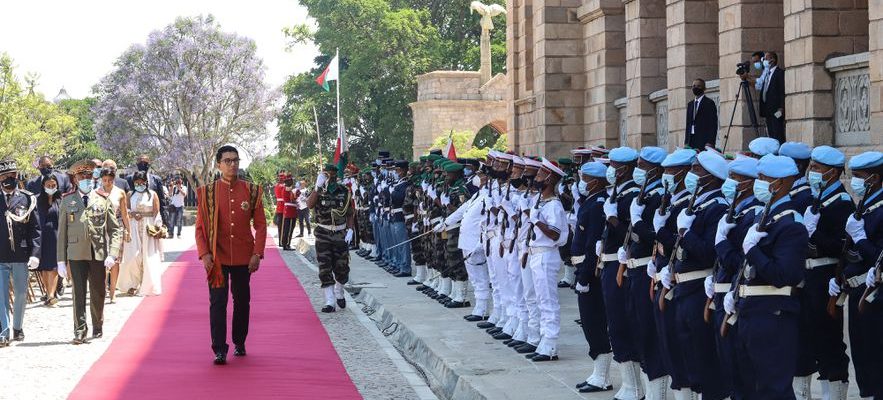Nicknamed “TGV” by his supporters who praise his dynamism, but described as “omnipotent” by his detractors, Andry Rajoelina, the President of the Republic of Madagascar, is soon coming to the end of his mandate, which began in 2019. From the top of his 49 years old, the former event entrepreneur has been at the forefront of the Malagasy political scene for fifteen years. Elected mayor of Antananarivo, the capital, in 2007, he headed the opposition movement to President Marc Ravalomanana in 2009, before chairing the High Authority for Transition until 2014. A few months before the next presidential election, scheduled for November on the Big Island, comes the hour of reckoning for the man who had made the development of Madagascar his great hobbyhorse. Interview.
L’Express: What is your assessment of your four years in power?
Andry Rajoelina: My main objective for this mandate has been to catch up with Madagascar’s development delay. From the beginning, I wanted to strengthen the presence of the State in the country, through the construction of infrastructures which the populations urgently need. One of the projects, for example, was to build 28 hospitals: 13 have been finalized, 15 are under construction. We have also launched the construction of a highway linking the large port of Toamasina to our capital. And relaunched the construction of a major pipeline to supply water to the south of the country, which is now suffering from famines linked to climate change.
And your failures?
Our country has been confronted in recent years with several major shocks which have disrupted our policy of combating poverty. The war in Ukraine has had a significant impact on our economy. It resulted in a sharp rise in the price of energy and foodstuffs. Before that, our tourism sector, a major axis of development for Madagascar, was damaged by the Covid-19 pandemic. Some major hotel construction contracts and projects failed to materialize. This is a great regret for me.
Will you be a candidate for re-election in the next presidential election?
For now, the most important thing for me is to finish what I started. I want to make sure that these major infrastructure projects will be operational quickly. Regarding a possible candidacy, everything in its time. I will announce my decision to the Malagasy people in due course.
At the beginning of April, several Western embassies expressed their “concern” after your government’s decision to ban political meetings in public places – knowing that this rule does not apply to members of the executive. What is your explanation?
First of all, this decision aims to guarantee public order by avoiding any overflow in this pre-election period. Next, I would like to recall that it is based on two ordinances from the 1960s. We have therefore not amended the law and have no intention of doing so. Moreover, it is distressing to put meetings organized by a political party on the same level as public meetings held by a government in the exercise of power. I want to emphasize that, unlike other countries in the region, there is real freedom of expression in Madagascar: the opposition can express itself and does not hesitate to do so daily in the various media in the country.
So you don’t understand these grievances?
No, we don’t understand them and we have discussed them with these foreign ambassadors. Basically, the press release from these diplomats looked like interference. Never has our ambassador in Paris, for example, made a press release to judge the measures decided by the French president or his government! And the same is true in other countries. In reality, Madagascar is on the right track in terms of democracy. In fact, we were ranked the 11th most democratic country in Africa in 2022.
The President of the Republic of Madagascar Andry Rajoelina arrives at the Queen’s Palace of Manjakamiadana, in the upper town of Antananarivo, November 6, 2020
© / AFP
At the start of your mandate, you said you wanted to make the fight against corruption a priority objective. But according to the latest ranking on corruption established by the NGO Transparency International, Madagascar stagnates in 142nd place out of 180. Why this result?
We have taken steps to fight corruption, but it is a long-term fight. While a law on the restitution of ill-gotten gains had always been rejected within our Parliament, I had this text adopted by ordinance, to show my desire to move forward on this subject. But the problem in Madagascar, as in other African countries, is the very low level of income. Therefore, corruption can remain when you need the services of the administration. This goes from the lowest level of the ladder, with district chiefs who will agree to speed up administrative procedures for a fee, to the highest, as in certain courts.
Regarding the war in Ukraine, Madagascar voted in favor of the UN resolution calling for the withdrawal of Russian troops from Ukraine in 2023, while the country had abstained in 2022. What explains this change? ?
Madagascar’s political line has always been to be non-aligned. But this position does not mean that we do not condemn this war. I condemn it, and I condemn the acts perpetrated against civilians. We want this conflict to end, along with the harmful impacts it has on the rest of the world. This is what we wanted to recall through the vote on this resolution, the terms of which had, moreover, changed somewhat compared to the previous one. We call on Ukraine and Russia to find a peaceful solution: any war always ends around a table.
Today, how is Madagascar positioned vis-à-vis Russia?
Madagascar wants to continue working with all countries, including Russia. But that does not mean that we take a position in favor of one or the other. This is what I wish to convey, like a certain number of friendly leaders, such as Macky Sall, the President of Senegal. We want to focus on our people, without other countries bringing problems to us. We already have enough worries to grow. We want to stay neutral. We are not responsible for this war, even if we are not insensitive to it.
We see that the Russian paramilitary group Wagner weaves its web in Africa. Have you been approached?
Wagner is not present in Madagascar and there are no discussions with this group either. On the other hand, former President Hery had brought Russian investors into Kraoma, a state mining company, in order to operate chrome mines. But the factory has been shut down for three years. In any case, I can tell you that we do not want foreign powers to try to influence our electoral process, as has been seen in other countries – and even in the United States.
Does the question of the Scattered Islands – administered by France, but claimed by Madagascar – still poison your relations with Paris?
It does not poison relations, but it is a matter of great importance that we must resolve. The Scattered Islands are part of our identity, and I think that by continuing our dialogue we can find common ground. A joint commission bringing together the Malagasy and French foreign ministers is due to meet soon to make progress on this subject. I also have to meet French President Emmanuel Macron in June, and that is of course a subject that we will discuss.
What is the state of your relationship with Emmanuel Macron?
There is a mutual understanding between us. But, above all, what I appreciate with President Macron is that we discuss as equals. We can talk to each other frankly and try to find a solution to each problem.

French President Emmanuel Macron greets Malagasy President Andry Rajoelina at the Elysée presidential palace on August 29, 2022
© / AFP
You say you enjoy discussing “as equals”… Isn’t that always the case with other Western leaders?
No, this is not always the case, even sometimes with certain French ministers! We don’t always feel listened to, or understood, which ruins relationships. This attitude explains the many frictions that exist today between Africa and other Western countries. Instead of having a dialogue, listening and exchanges, there is sometimes among Westerners a temptation to impose their point of view. And that’s not a good thing, because we’re all sovereign countries and there needs to be mutual respect.
Do you want to change the relationship with Westerners?
We need a partnership, but we don’t want to be told what to do. Africa does not want to take lessons from Western countries, so there needs to be a change in the way of doing things. Whether it concerns our policies or votes at the United Nations, there are sometimes pressures on the decisions that are made. But we have to take our voice into consideration. This is an important point to improve in our relations.
With regard to Philippe Marc François and Paul Maillot Rafanoharana, the two Frenchmen sentenced to forced labor in Madagascar in the context of the Apollo 21 affair: is their transfer to France, as demanded by their families and their lawyers, possible? ?
Today there have already been two requests in this direction: one has been rejected and the other is being studied by the Malagasy justice, which I remind you, is independent. I’m waiting for her to give her opinion. But this decision will also have a political dimension, because the facts of which they are accused are very serious. The situation of these two Frenchmen is currently the subject of discussions with the French authorities.
What is the famine situation in the south of the country today, when in 2022 the United Nations World Food Program (WFP) warned of nearly 2 million people at food risk?
The situation is currently stabilized, but there is still a risk: we are an island country and therefore exposed to climatic hazards. In 2022, four cyclones hit us in just a month and a half. And they are becoming more and more violent and frequent. Last year, more than 178,000 hectares of rice fields were ravaged and flooded. However, most of the populations residing in these areas live only from their culture. We are of course doing everything to help and support them, for example by providing them with fertilizer and seeds. But we need to go further. This is why I launched an appeal during the last meeting of the COP, in order to help the countries which bear the full brunt of climate change. Like Madagascar, which is the first country to suffer climatic famine.
